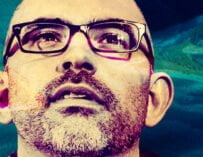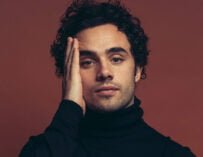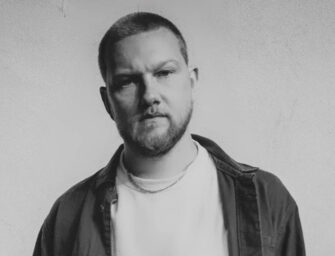
Sam Genders: “I often find life a bit of a struggle, but I also do feel it’s full of incredible experiences”. Pic: Chrissie Abbott
The creative force behind Diagrams, and former Tunng frontman, discusses the many ways he makes a living as a songwriter
 aving left London and moved to Sheffield, Sam Genders recently released his second album under the moniker Diagrams. Brought out earlier this year, Chromatics is a majestic record which marked the pinnacle of his songwriting journey to date. One of the co-founders of iconic folktronica band Tunng, Genders has also worked with The Accidental as well as written for other artists such as Gomez’s Ben Ottewell.
aving left London and moved to Sheffield, Sam Genders recently released his second album under the moniker Diagrams. Brought out earlier this year, Chromatics is a majestic record which marked the pinnacle of his songwriting journey to date. One of the co-founders of iconic folktronica band Tunng, Genders has also worked with The Accidental as well as written for other artists such as Gomez’s Ben Ottewell.
With the album tour over it was the perfect time for Songwriting to speak to Sam about what life is like for the modern songwriter…..
What does the album Chromatics mean to you and would a fair description of the record be that it is realistically hopeful?
“I think there’s a lot in there about relationships. I often don’t find relationships that easy, but, relating to what you say about it feeling ‘realistically hopeful’, that’s how I feel about relationships and about life in general really. I often find life a bit of a struggle, but I also do feel it’s full of incredible experiences and is in itself an incredible experience.”
The album starts with the line “here I crawl through that old umbilical”, is it a journey through life?
“You know what, I’ve never realised that. To be honest I just chose it because it was a good opener. A lot of people seemed to like it so I thought that’s probably good, in this day and age, when you want to encourage people to listen past the first few bars of the first song. I chose the order purely just based on what I thought felt good. I didn’t set out with any concept or plan to do things a certain way but I do think there are certain things that run through it. It kind of fits.”
Would you say that it’s more accessible than your previous album, Black Lights?
“Yes, definitely. I think one reason why was that I had done a lot of co-writing between the two albums, so I had a lot of writing where part of the goal was to be concise and catchy, and I think that probably did rub off a little bit. The other thing, and perhaps this is a bigger reason, was that it was very late in the process when I found a producer. Because I didn’t know who was going to produce it I tended to play it a bit safer with the structures. With Black Lights I was writing the album as I was making it and I was already working with the producer Mark Brydon. This time I didn’t know who was going to produce it so I wanted a set of songs that would work with whoever I ended up with, and so the song structures are a bit less experimental.”
Is this the first record you’ve recorded since moving to Sheffield?
“Yes and it was written here as well. I suppose that had an impact, musically the songs are more straightforward and lyrically they’re less abstract and more personal. That came because I’d just got married and was in a new place and a new way of living and from feeling quite comfortable here as well.”
You’ve previously mentioned how literature by Helen Mort and Ester Perel also inspired your writing.
“Ester Perel actually writes about relationships so that was the link there. Helen Mort is a really brilliant Sheffield based poet but it wasn’t like I was reading her book and lifting ideas out of it. It was just one of the things that I was reading around that time and if nothing else it encouraged me to try and write good lyrics.”
[cc_blockquote_right] I WAS REALLY STRUGGLING FINANCIALLY SO I TOOK ON SOME TEACHING [/cc_blockquote_right]
Is it a quiet time for you currently, the album has been released, you’ve toured it and are now waiting for the festival season?
“Not really, I’m so busy that it doesn’t feel like a quiet patch. I do a couple of days each week guitar teaching and that’s quite a recent thing, so I have to do a lot of planning and then I have quite a few other projects on the go. If you work as a musician you have to try and cultivate lots of different things all the time so that there’s the possibility of some income coming.”
Is that why you are doing the teaching, or is there a part of you that would like to be a teacher?
“I think it’s possibly a bit of both. I definitely started doing it just because I needed income. There were a few months when I was really struggling financially so I took on some teaching and I thought I could do it for a certain amount of time, then stop doing it when things picked up. Especially when a lot of earnings relate to album cycles it can be quite hard to judge how much money you’re going to have. But I have to say that since I’ve been doing it I’m really enjoying it. When I was teaching before I wasn’t teaching music I was a teaching assistant at schools. I think I’ve come on quite a lot as a teacher since then. I feel like I’m building a new skill that I could use in the future.”
Does it help you appreciate song structures in a different way?
“Definitely. In terms of music theory I really don’t know very much. I’m not exaggerating by saying that I’m currently at page 10 of book one of How To Play Guitar. I’m learning new things and having to learn scales because it needs to be part of what I’m teaching. It’s opened up some new doors and it’s nice working with kids and helping them feel enthusiastic about music. I spend a lot of my time doing speculative work that may or may not bring any money in and it’s quite nice to just go to work and earn some money and come home again.”
Do you teach the kids Smoke On The Water?
“That’s one I do! It’s great, people make fun of that but kids just love it and it’s dead easy and I’ve made recordings of it that they can play along to and we have good fun. Seven Nation Army is another popular one and then I’m teaching from a book called Starting Guitar by Matt Scharfglass which is basic.”
So will there be a hard rock element to your next album?
“You never know. It certainly makes you want to go out and get an electric guitar and get some riffage going.”
And you also do some co-writing and write for other musicians?
“I do yeah. I’ve done quite a lot of writing with Ben Ottewell who is in Gomez. I’ve co-written a couple of solo albums with him and written with a guy called Liam Bailey who is a soul singer probably best known over here for a song called Blind Faith with Chase & Status. I’ve done some writing for him and a few other people and I’ve got a few things in the pipeline as well. It’s very much something that I get a lot out of and would like to do more of.”

Sam: “don’t drink too much when you’re on tour”
Do you approach in a different way than when you’re writing for yourself?
“To a certain extent, I guess I’m more there to provide ideas. Mostly I’ve worked with artists who have a strong idea of what they want to do and so I’m not really there to have creative control. I’m there to put in ideas and shape things. I actually find the process quite liberating because when I’m writing for myself I agonise over whether I like it or whether it’s right. Whereas when I’ve been writing for somebody else I can just treat it as a bit of fun. When I first started doing it, it was quite challenging because you have to put aside your ego and your own desires. But now I quite enjoy relinquishing a bit of control and I also enjoy trying to step into someone else’s voice. Funnily enough I find I often get a lot of ideas because I might be working with a set of concepts or ideas or musical forms that I don’t normally work with. It’s like a new area for discovery and exploration.”
Does having constraints make the creative process a little easier?
“Maybe and certainly at the end of the day they take it away and they do something with it and that’s kind of liberating too. I’ve done my day’s work, that’s the session over and I can move on to something else. Whereas when it’s my own stuff there’s always so much organization. I’ve got to get it recorded, get it on an album, tour the album, find musicians, there’s a whole world of stuff that needs doing. I love doing it and it’s exciting but it’s really nice sometimes just to be able to be creative and have some fun and then let it go.”
Is it harder letting go of your own stuff?
“When I’m writing for myself I feel a lot more pressured to get to a stage where I really feel it represents me and what I’m trying to do. That pressure is taken off to a certain extent when I’m writing with other people. Both ways of writing have their challenges but they’re essentially both good fun things to do. I wouldn’t say I find it too hard.”
In an interview, Mike Lindsay described you as having a folk-upbringing, is that a fair description?
“That’s not strictly true, but what is true is that when I was about 20 I moved in with a family in the village of Matlock Bath in Derbyshire. I moved in with a guy called Colin Hall, his wife Sylvia and their daughter Hannah. Colin is a music journalist and became my first manager. He had a huge record collection and played me a lot of folk music like Fairport Convention, John Martyn and Richard Thompson as well as lots of classic music such as The Byrds and Jackson Browne. A lot of our time was spent listening to music and when I started I was very influenced by folk music. I also ended up meeting a guy called John Tams, him and Colin both mentored me. When I first met Mike I was a singer songwriter doing essentially folk inspired stuff and I think that’s what he is referring to.”
So was the dynamic with Tunng that you brought the folk element and he brought the electronica?
“Well actually Mike’s a great guitarist and brought a lot of folk finger-picking. It was a mixture of the both of us but definitely what I was bringing was the sort of songwriting and lyrical element to things and a folk influence. Mike had that folk influence too and then he had the electronica side of things and he’s also a great songwriter as well.”
[cc_blockquote_right] THEY TOOK ME OUT FOR A DINNER OF PIGS BRAINS AND INTESTINES [/cc_blockquote_right]
Is the combination of folk and electronica something you took forward when you left the band?
“I was always looking for someone a bit like Mike. Before we met I was inspired by artists like Beck and Gomez who were mixing electronic elements with a more bluesy or hip hop influence. I was aware that no one was really doing it with folk and that there was something in this. Then I met Mike and we tried some things out and it made sense to start working together and I learnt a lot from watching him and I think it has influenced what I’ve gone on to do later.
“To be honest I don’t really see electronica as being that different from brass or strings. Sometimes I’m perplexed that people put themselves off from certain instrumentation. I find it interesting that people decide that they’ll never do anything that’s got electronics or you get someone else who never does anything that’s got brass. I’m not self-disciplined enough to do that.”
On the flipside, is there anything you learnt not to do from your time in Tunng?
“Not really, don’t drink too much when you’re on tour maybe. I think I learnt a lot of good stuff really.”
How did your recent time in China working as PRS ambassador come about?
“Someone nominated me to apply and I was lucky enough to get selected. I went to a city called Changsha and it was a really incredible life experience and quite a challenging work experience. A lot of things I was led to believe were in place for me, such as a rehearsal space and musicians, when I actually got there they weren’t booked. It began in a very stressful way but after a couple of weeks I realised that culturally things are very different there and nothing I was promised was going to happen in the way that I expected it to happen. I realised that I had to take it moment to moment and see what happened and I started to really enjoy the experience.
“I did manage to put on a concert after about three weeks there with a Chinese band. It was really good fun and I made quite a few field recordings which I’m still hoping to do something with. I had a couple of special moments like when we visited an ancient city called Phoenix, the city that inspired Kung Fu Panda. When I first arrived I was whisked off into the new part of the city and a crowd of about 300 people were watching folk opera songs being played by a band on what was essentially a concrete platform at a traffic intersection through a really crappy karaoke speaker system, it was really bizarre but brilliant. Then I was handed a rusty old out of tune guitar and thrust upon stage to sing a song for everyone which was terrifying but really nice. The response was very friendly although I’m fairly confident that it sounded awful. Everyone was really welcoming and they took me out for a dinner of pigs brains and intestines, which was even more terrifying!”
Will the trip have a direct influence on your next work?
“I think it’s hard not to be influenced by something like that but I’m not quite sure whether it will influence the actual music. I’m not expecting to suddenly start using oriental scales and eastern sounding melodies. It was life-changing and really forced me to live in the moment for a few weeks. There’s so much to see, so much that’s different. I’m sure that lyrically it will come out in some way but perhaps not in an overtly obvious way.”
Lastly, you’ve mentioned some of the different ways you forge a living in music. Do you have a particular viewpoint on Spotify and streaming and their impact on songwriters?
“I do agree with the general idea that it’s a mistake to think that you can stop it. It’s such an integral part of the way technology works. I think the concept of having streaming that you pay for is basically a good concept. Instead of people paying nothing at least it’s creating some sort of revenue. I’d like to think that maybe it could become contractually better for artists, a bigger share of what’s going on, but I think the thing is it’s getting so easy to make and share music yourself that I there is an impetus for the industry to make sure that artists are getting a fair cut because there could be a stage in the future whereby an artist is just not signing to a label because they can do the sharing themselves.
“Does it go without saying that if you’re an artist you should be making lots of money from it? I don’t know if that’s necessarily true, but I think people need to get a fair amount of money for the work they’re putting in.”
Interview: Duncan Haskell
Chromatics is out now on Full Time Hobby and Diagrams will be playing festivals this summer. Find out more here: diagramsmusic.co.uk































Related Articles